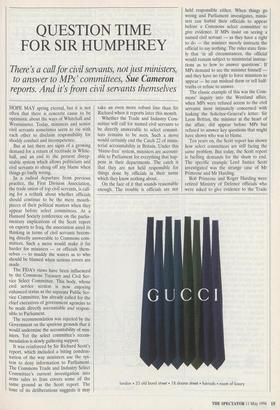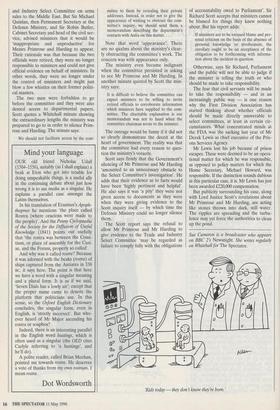QUESTION TIME FOR SIR HUMPHREY
There's a call for civil servants, not just ministers,
to answer to MPs' committees, Sue Cameron
reports. And it's from civil servants themselves
HOPE MAY spring eternal, but it is not often that there is concrete cause to be optimistic about the ways of Whitehall and Westminster. Today, ministers and senior civil servants sometimes seem to vie with each other to disclaim responsibility for shoddy conduct and incompetence. But at last there are signs of a growing demand for a return of rectitude in White- hall, and an end to the present disrep- utable system which allows politicians and civil servants to shrug off any blame when things go badly wrong.
In a radical departure from previous practice, the First Division Association, the trade union of top civil servants, is call- ing for a rethink about whether officials should continue to be the mere mouth- pieces of their political masters when they appear before select committees. At a Hansard Society conference on the parlia- mentary implications of the Scott report on exports to Iraq, the association aired its thinking in terms of civil servants becom- ing directly answerable to Commons com- mittees. Such a move would make it far harder for ministers — or officials them- selves — to muddy the waters as to who should be blamed when serious errors are made.
The FDA's views have been influenced by the Commons Treasury and Civil Ser- vice Select Committee. This body, whose civil service section is now enjoying enhanced status as the separate Public Ser- vice Committee, has already called for the chief executives of government agencies to be made directly accountable and respon- sible to Parliament.
The recommendation was rejected by the Government on the spurious grounds that it would undermine the accountability of min- isters. Yet the select committee's recom- mendation is slowly gathering support.
It was reinforced by Sir Richard Scott's report, which included a biting condem- nation of the way ministers use the sys- tem to deny information to Parliament. The Commons Trade and Industry Select Committee's current investigation into arms sales to Iran covers some of the same ground as the Scott report. The tone of its deliberations suggests it may take an even more robust line than Sir Richard when it reports later this month.
Whether the Trade and Industry Com- mittee will call for named civil servants to be directly answerable to select commit- tees remains to be seen. Such a move would certainly end the Catch 22 of minis- terial accountability in Britain. Under this `blame-free' system, ministers are account- able to Parliament for everything that hap- pens in their departments. The catch is that they are not held responsible for things done by officials in their name which they know nothing about.
On the face of it that sounds reasonable enough. The trouble is officials are not held responsible either. When things go wrong and Parliament investigates, minis- ters can forbid their officials to appear before a Commons select committee to give evidence. If MPs insist on seeing a named civil servant — as they have a right to do — the minister merely instructs the official to say nothing. The rules state firm- ly that 'in all circumstances, the official would remain subject to ministerial instruc- tions as to how to answer questions'. If MPs demand to see the minister himself and they have no right to force ministers to appear — he can mislead them or tell half- truths or refuse to answer.
The classic example of this was the Com- mons' inquiry into the Westland affair, when MPs were refused access to the civil servants most intimately concerned with leaking the Solicitor-General's letter. Sir Leon Brittan, the minister at the heart of the affair, did appear before MPs but refused to answer key questions that might have shown who was to blame.
Ten years on, the Scott report has shown how select committees are still facing the same problem. But today, the Scott report is fuelling demands for the sham to end. The specific example Lord Justice Scott investigated was the strange case of Mr Primrose and Mr Harding.
Bob Primrose and Roger Harding were retired Ministry of Defence officials who were asked to give evidence to the Trade and Industry Select Committee on arms sales to the Middle East. But Sir Michael Quinlan, then Permanent Secretary at the Defence Ministry, and Sir Robin Butler, Cabinet Secretary and head of the civil ser- vice, advised ministers that it would be `inappropriate and unproductive' for Messrs Primrose and Harding to appear. Their rationale was that because the two officials were retired, they were no longer responsible to ministers and could not give official evidence on behalf of ministers. In other words, they were no longer under the control of ministers and might just blow a few whistles on their former politi- cal masters.
The two men were forbidden to go before the committee and they were also denied access to departmental papers. Scott quotes a Whitehall minute showing the extraordinary lengths the ministry was prepared to go to in order to silence Prim- rose and Harding. The minute says:
We should not facilitate access by the corn- mittee to them by revealing their private addresses. Instead, in order not to give the appearance of wishing to obstruct the com- mittee's inquiry, we should send them a memorandum describing the department's contacts with Astra on this matter. . . .
Note that word 'appearance'. There are no qualms about the ministry's clear- ly obstructing the committee's work. The concern was with appearance only.
The ministry even became indignant when the committee persisted in asking to see Mr Primrose and Mr Harding. In another minute quoted by Scott the min- istry says: It is difficult to believe the committee can expect ministers to be willing to invite retired officials to corroborate information which ministers have supplied to the com- mittee. The charitable explanation is our memorandum was not to hand when the committee chairman wrote to the minister.
The outrage would be funny if it did not so clearly demonstrate the deceit at the heart of government. The reality was that the committee had every reason to ques- tion the ministry's veracity.
Scott says firmly that the Government's silencing of Mr Primrose and Mr Harding `amounted to an unnecessary obstacle to the Select Committee's investigation'. He adds that their evidence as to facts would have been 'highly pertinent and helpful'. He also says it was 'a pity' they were not given access to documents as they were when they were giving evidence to the Scott inquiry itself — by which time the Defence Ministry could no longer silence them.
The Scott report says the refusal to allow Mr Primrose and Mr Harding to give evidence to the Trade and Industry Select Committee 'may be regarded as failure to comply fully with the obligations of accountability owed to Parliament'. Sir Richard Scott accepts that ministers cannot be blamed for things they knew nothing about. But his report adds:
If ministers are to be excused blame and per- sonal criticism on the basis of the absence of personal knowledge or involvement, the corollary ought to be an acceptance of the obligation to be forthcoming with informa- tion about the incident in question.
Otherwise, says Sir Richard, Parliament and the public will not be able to judge if the minister is telling the truth or who should be made to take responsibility.
The fear that civil servants will be made to take the responsibility — and in an increasingly public way — is one reason why the First Division Association has started thinking about whether officials should be made directly answerable to select committees, at least in certain cir- cumstances. What concentrated minds at the FDA was the sacking last year of Mr Derek Lewis as chief executive of the Pris- ons Services Agency.
Mr Lewis lost his job because of prison escapes. These were deemed to be an opera- tional matter for which he was responsible, as opposed to policy matters for which the Home Secretary, Michael Howard, was responsible. If the distinction sounds dubious in this particular case, it is. Mr Lewis has just been awarded £220,000 compensation.
But publicity surrounding his case, along with Lord Justice Scott's revelations about Mr Primrose and Mr Harding, are acting like stones thrown into dark, still water. The ripples are spreading and the turbu- lence may yet force the authorities to clean up the pond.
Sue Cameron is a broadcaster who appears on BBC 2's Newsnight. She writes regularly on Whitehall for The Spectator.
`Kids today — they don't know they're born.'



































































 Previous page
Previous page